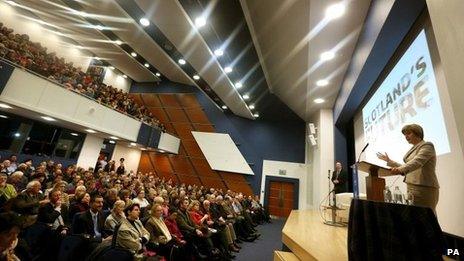Scottish independence: Sturgeon speech kicks off 'intriguing' year
- Published

Nicola Sturgeon addressed members of the public, academics and staff
Perhaps it is the turning of the year, perhaps it is my recent wedding anniversary or my impending birthday - these days, they loom rather than spring - but I could not resist indulging in a little gentle, internal nostalgia as I covered the deputy first minister's speech today.
Nicola Sturgeon was speaking in the Buchanan Theatre in St Andrews, part of the university. Her lecture had been shifted from the considerably more historic Parliament Hall because of the large number who wanted to attend.
I had been looking forward to revisiting Parliament Hall which was, in my long distant day, a senior honours reading room. Incidentally, it gained its name because the pre-Union Scots Parliament had to shift there for a spell, owing to an outbreak of plague in Edinburgh.
Ms Sturgeon assured her audience that, although Edinburgh was now thankfully plague free, she was delighted to be in the Auld Grey Toun of St Andrews. And so the Buchanan Theatre it was.
Interlinked plots
For me, the venue meant nostalgia, part two. I attended lectures there in Philosophy and French. More to the point, I appeared on that very stage in two farces by Molière, playing small but utterly seminal roles.
I recall, I am afraid, very little about my characters themselves and even less about the French lectures to which I paid, at the time, such assiduous attention. However, Molière is renowned for his interlinked plots, combining sharp wit with popular confusion. Brian Rix greets Basil Fawlty. In seventeenth century French.
Much of the coming year will be taken up with efforts to wrestle with the complexities of constitutional politics before answering the simple question: "Should Scotland be an independent country?" (To emphasise, it is the question which is simple, not the accompanying debate, on either side.)
Entirely understandably, Ms Sturgeon suggested today that hard questions should also be addressed to those who would answer No to the fundamental question which will be posed on 18 September.
Her choice of context was intriguing. Partly, it was driven by another speech made today, that from UK Chancellor George Osborne. Partly, it reflects a private view - held by several strategists on both sides of the referendum campaign - that 18 September will be determined by Labour-inclined voters in Scotland.
Detailed ripostes
Mr Osborne has said that a further £25bn in spending cuts would be required in the first two years of the next Parliament, post the UK General Election in May 2015. Nearly half of that, some £12bn, would come from welfare benefits - although pensions would be protected by the existing triple lock.
His initiative is, of course, aimed at that May 2015 date. It is a challenge to Labour - and to his current coalition colleagues, the Liberal Democrats. What would you cut? If not benefits, then what? Would you also protect pensions? Do you accept my diagnosis? If not, then what?
The chancellor's rivals will produce their detailed ripostes in due course: indeed, they are already out there in outline form as is fitting, given that Mr Osborne was also talking in relatively general terms with regards to the source of savings.
Nicola Sturgeon chose a different time line. She asked about the implications for 18 September. The chancellor's speech, she said, painted one possible scenario for Scotland in the event of a No vote in the referendum. The Tories could be returned to sole UK power and could pursue Mr Osborne's aims.
But she broadened that still further. Cuts to public spending in England, she said, would impact on Scotland: she used the example of health where any enhanced focus upon private provision south of the border would trim the English public health budget, with consequences for Scotland.
Labour, she said, might be returned to UK power - and might stop such cuts. As they might for the welfare budget. Or, she posited, they might not. They might not win.
Her argument, in essence, was that independence removed the prospect of a returned Conservative government with, she implied, policies inimical to the consensus in Scotland which she depicted as defaulting to the communitarian left.
Passionate rhetoric
This is a development of the "retail offer" which featured in the White Paper: vote for independence and you open the prospect of, for example, enhanced childcare. (More on that tomorrow at Holyrood.)
Ms Sturgeon is saying to Labour-inclined voters in Scotland: back independence to make sure that the Tories lose control of your lives.
Now, Ms Sturgeon's opponents will attack her, variously. The Tories will say that Mr Osborne's medicine is essential for the recovery of the whole UK - while independence would be dangerous. The Liberal Democrats will say that they have backed the UKG economic project thus far, while laying emphasis on the need to make taxation fairer.
And Labour? They will match Ms Sturgeon in criticising the Osborne prospectus - while arguing that there are uncertainties and risks intrinsic in independence which undermine that offer.
This will truly be an intriguing, if complex, year. But then whoever expected such a big issue to be easy? It will be a year of intricate analysis and passionate rhetoric. Brush up your Molière.